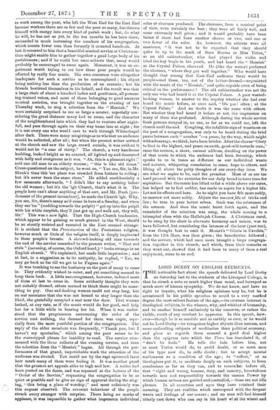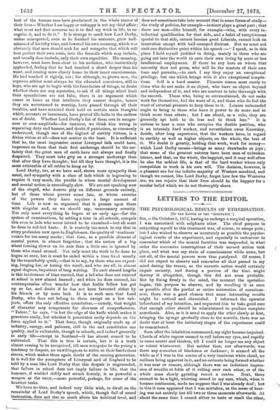LORD DERBY ON ENGLISH STUDENTS.
TETE noticeable fact about the speech delivered by Lord Derby on Saturday last to the students of the Liverpool College, is that he struck a note so much higher than usual, and betrayed no much more of human sympathy. We do not know, and have no right to inquire, what his religious opinions may be, but he is accustomed in his public speeches to avoid to a very marked degree the most salient feature of the age,—its extreme interest in theological subjects, in the whence, why, and whither of humanity, and to confine himself exclusively to the concrete, or rather the visible, result of any conduct he approves. In this speech, how- ever—though he is as sensible and as earthly as ever, or he would not be Lord Derby—he recognises higher objects than success, and more enthralling subjects of meditation than political economy, and gives as regards them counsel a good deal higher than the epigram into which the Times has translated it, of "don't be fools." He tells the lads before him, not as most Tories would do, to avoid doubt, or as most men of his type now do, to stifle doubt ; but to accept mental restlessness as a condition of the age ; to "reflect," or as theologians put it, to meditate deeply on such subjects, to form conclusions as far as they can, and to remember before all, that "right and wrong, honour, duty, and country, benevolence towards men and responsibility towards the unseen Power by which human actions are guided and controlled,— these are not idle phrases. In all countries and ages they have retained their meaning. They are realities which correspond with the deepest wants and feelings of our nature ; and no man will feel himself utterly cast down who can say in his heart wl at the wisest and
best of the human race have proclaimed in the whole tenour of their lives—Whether I am happy or unhappy is not my chief affair ; what most and first concerns me is to find my work in life, to re- cognise it, and to do it." It is strange to mark how Lord Derby, unless misreported, even as he finished his sentence, grew half- ashamed of his lofty tone, and lowered his own meaning, which was obviously that men should seek for and recognise that which will best perfect their own souls, into, the formula which may include, and usually does include, only their own capacities. His meaning, however, must have been clear to his audience, who instinctively applauded, feeling that he had touched a chord deeper than his wont, and coming more closely home to their inner consciousness. He had touched it rightly, too ; for although, to grown men, the supreme arbiter must always be the educated conscience, still to boys, who are apt to begin with the foundation of things, to doubt whether there are any mysteries, to ask if all things which limit their speculations are not false, there is no argument which comes so home as that intellects they cannot despise, heroes they are accustomed to worship, have passed through all their troubles, and have retained their hold on certain main thoughts which, accurate or inaccurate, have proved life-belts in the endless sea of doubt. Whether Lord Derby's list of them errs in meagre- ness or over-amplitude—for instance, we think him wrong in separating duty and honour, and doubt if patriotism, as commonly understood, though one of the highest of earthly virtues, is a divine virtue at all—does not matter in the least. It is sufficient that he, the most impressive orator Liverpool lads could have, impresses on them that their first anchorage should be the cer- tainty that the great men of earth have not always and finally despaired. They must take grip on a stronger anchorage than that after they have thought ; but till they have thought, it is the most attainable of all cables to hang on by.
Lord Derby, too, as we have said, shows more sympathy than usual, and sympathy with a class of lads which is beginning to require it very much, the youths in whom mental development and mental action is exceedingly slow. We are not speaking now of the stupid, who deserve pity on different grounds entirely, but of those whose powers come late, or whose exercise of the powers they have requires a large amount of time. Life is now so organised that it presses upon these with singular and, as we should say, unnecessary severity. Not only must everything be begun at an early age—for the system of examinations, by setting a tone in all schools, compels this even in lads who never intend to be examined—but all must be done in red-hot haste. It is scarcely too much to say that in every profession now open to Englishmen, the quality of 'readiness' counts for too many marks ; that time, as a possible element of mental power, is almost forgotten ; that the notion of a big wheel turning slower on its axis than a little one is ignored by those who stand around. Not only must the work to be done be begun at once, but it must be ended within a time fixed usually by the remarkably quick,—that is to say, by those who are expect- ing, longing for, or hating the result, and who are all, in almost equal degrees, impatient of long waiting. To such absurd lengths is this intolerance of time carried, that a lad who does not succeed at school is now almost banned ; and when he does succeed, his contemporaries often wonder how that feeble fellow has got up so far, and doubt if he has not been favoured either by his friends or by mere luck. It is to such men that Lord Derby, who does not belong to them except on a few sub- jects, offers the only effective consolation,—namely, that weight of character may compensate for slowness of comprehension. "Talent," he says, "is but the edge of the knife which makes it penetrate easily, but whether it penetrates easily depends on the force applied to it." That force, though originally made up of industry, energy, and patience, still in the end constitutes one quality, and is culturable, though in schools, and indeed generally in early life—except in Scotland—it has almost ceased to be cultivated. That this is true is certain, but it is a truth almost ceasing to be recognised, till men recognise in the young a tendency to despair, an unwillingness to strive as their forefathers strove, which makes them again doubt of the coming generation. It is well for the youngsters of Liverpool and of England to be told by a man like Lord Derby that this despair is ungrounded, that failure in school does not imply failure in life, that the hammer, if wielded deftly and struck fiercely, is as powerful a weapon as the razor,—more powerful, perhaps, for some of the heaviest tasks.
We have no time, and indeed very little wish, to dwell on the remainder of Lord Derby's speech, which, though full of sound instruction, does not rise so much above his habitual level, and
does not sometimes take into account that in some forms of study— the study of politics, for example—instinct plays a great part ; that there are men—like himself, for example—who, with every in- tellectual qualification for that side, and a habit of receptiveness special to that side, cannot become good Liberals, cannot look on innovation except with half-annoyed distrust. But we must not omit one distinctive point within his speech :—" I speak, as in this place I hold myself justified in doing, mainly to those who are going out into the world to earn their own living by more or lees intellectual employment. If there be any here on whom that necessity does not press, who will be the masters of their own time and pursuits,—to such I say they enjoy an exceptional privilege, but one which brings with it also exceptional tempta- tions. Self is a hard master. Pleasure comes most surely to those who do not make it an object, who have an object beyond and independent of it, and who are content to take the rough with the smooth. Those who, being so circumstanced, do not make work for themselves, feel the want of it, and those who do feel the want of external pressure to keep them to it. Leisure unbounded ought to bring to those who have it power to do more and to think more than others ; but I am afraid, as a rule, they are generally apt both to do less and to think less." It is curious to hear a man who occupies the double position, who is an intensely hard worker, and nevertheless owns Knowsley, decide, after long experience, that the workers have, in regard to earthly as well as higher objects, on the whole, the best of it. We doubt it greatly, holding that work, work for money— which Lord Derby means—brings as many drawbacks as joys ; that some of the greatest natures have been men of unbroken leisure, and that, on the whole, the happiest, and it may well often be also the noblest life, is that of the hard worker whose only compulsion to work is his own will. The decision, however, is a pleasant one for the infinite majority of Western mankind, and though we cannot, like Lord Derby, forget how few the Westerns are, we can rejoice that their lives should be the happier for a secular belief which we do not thoroughly share.



































 Previous page
Previous page